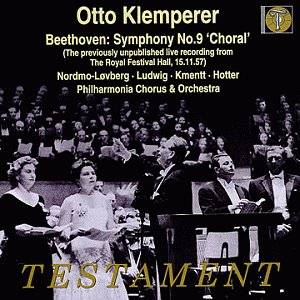BEETHOVEN: Symphony No.9 in D minor, Op.125
"Choral"
 Aase Nordmo-Lovberg (soprano),
Christa Ludwig (contralto), Waldemar Kmentt (tenor), Hans Hotter (bass);
Philharmonia Chorus; Philharmonia Orchestra conducted by Otto
Klemperer
Aase Nordmo-Lovberg (soprano),
Christa Ludwig (contralto), Waldemar Kmentt (tenor), Hans Hotter (bass);
Philharmonia Chorus; Philharmonia Orchestra conducted by Otto
Klemperer
 TESTAMENT SBT 1177
[70'48"]
TESTAMENT SBT 1177
[70'48"]

The Philharmonia Chorus made its debut in London's Royal Festival Hall on
November 12th and 15th 1957 in performances of Beethoven's
Choral Symphony under Otto Klemperer. Columbia recorded this second performance
in fine stereo but it's remained unissued, presumably because Klemperer's
studio version - made a week later - was given precedence. Testament now
makes available a wholly compelling performance, one of the finest 9ths I
have heard in many a year.
Klemperer presented music in black and white. His structural focus, his honesty
and integrity, gave his music making an unvarnished truth. Rarely one to
play music faster than it needed to go, Klemperer's interpretative middle
course between two famous contemporary rivals - Furtwangler's mystery and
scope, and Toscanini's remorselessness - satisfies the music's direction
and resolution. Founded on an orchestral layout of divided violins (so important
in clarifying dialogue between the two sections) and with a forward woodwind
balance that releases pertinent details, Klemperer leads a performance both
monumental and human that absorbs the listener.
The Philharmonia Orchestra responds to the occasion with playing that is
insightful, committed and gloriously attuned to Klemperer's concentrated
conducting. Klemperer's emphasising of orchestral sonority - such as biting
trombones in the last movement and exciting timpani thwacks throughout -
makes for invigorating listening. And Klemperer's deliberate tempo for the
Scherzo and his observation of its long second repeat makes this movement
almost as long as the first, emphasising the symphony's scale. With Klemperer
at the helm, a world of rugged sound and sincere expression is created -
ideal for Beethoven.
Klemperer's tempi content each movement and are movement-related. This
relationship of pulse - a moderate scherzo and flowing Adagio for example
- throws a gigantic through-line over the four movements which is maintained
in a buoyant reading of the choral finale that comes to life on, and is sustained
by, one breath. The Philharmonia Chorus's immaculate tones and unanimous
phrasing further distinguish this last movement. The soloists are individually
distinctive and respond as a team to Klemperer's direct approach.
As I've already suggested, the stereo sound is excellent. In particular,
London concertgoers will recognise the Royal Festival Hall's dry but clear
acoustic, an admirable space for Klemperer's unfussy but penetrating conducting.
With applause fore and aft, and between-movement coughs and tuning, this
is the concert as it took place - a magnificent Beethoven 9. Hearty thanks
to Testament for issuing this wonderful document of Klemperer's greatness
- caught on the wing.
Reviewer
Colin Anderson

See also previous review by Gerald
Fenech
